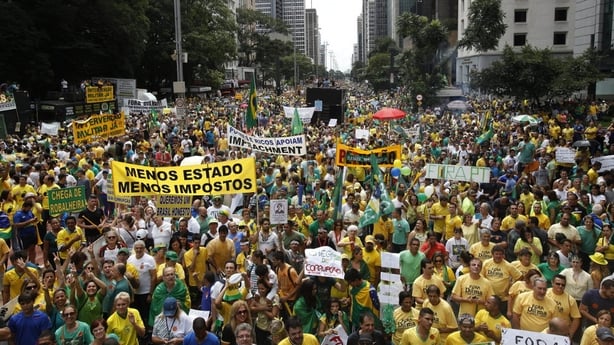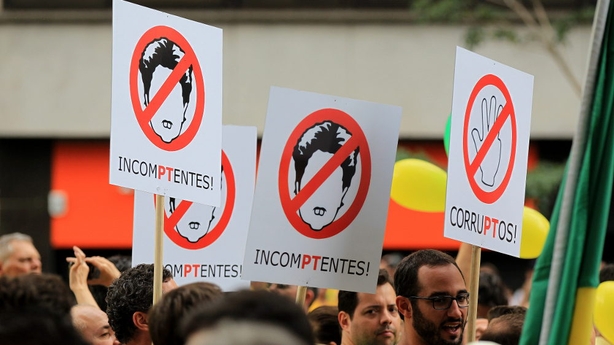More than a million people turned out for demonstrations nationwide against Brazil's President Dilma Rousseff, a target of rising discontent amid a faltering economy and a massive corruption scandal at state oil giant Petrobras.
Protesters came out in the economic capital Sao Paulo, a stronghold of the opposition to Ms Rousseff, according to local police estimates.
Protesters also demonstrated in 74 other cities and towns across the country, with tens of thousands showing up in the capital of Brasilia and thousands more protesting in Rio de Janeiro and Salvador de Bahia.
Dressed in the yellow and green of Brazil's flag, many protesters demanded the impeachment of Ms Rousseff, who has just begun her second term after re-election at the end of 2014.
In Rio de Janeiro, people waved Brazilian flags along the coastal Copacabana avenue behind a truck blaring slogans against Ms Rousseff. "Out Dilma, out PT," people chanted.
The large mobilisation was reminiscent of the demonstrations Brazil saw in mid-2013, as people protested transport fare increases and the huge cost of staging the World Cup and Olympics.
 A few protesters even called for military intervention to end the Workers Party's (PT) 12 years in power.
A few protesters even called for military intervention to end the Workers Party's (PT) 12 years in power.
Dozens of political figures, including close allies of Ms Rousseff, and former Petrobras executives are under investigation over a kickback and money laundering scheme that saw an estimated $3.8bn creamed off inflated contracts over a decade at the state-owned oil producer.
No one has been convicted yet, but some of the alleged wrongdoing took place while Ms Rousseff was chairman of the Petrobras board.
Twenty-two deputies, 13 senators and two governors have been implicated in the bribe-taking allegations, though Ms Rousseff is not being investigated.
Her supporters rallied on Friday, following calls by unions and social movements close to the PT. Those rallies were attended by 148,000 people, according to organisers, and 32,000 people, according to police.
In addition to the corruption scandal at Petrobras, Ms Rousseff is also facing rising inflation and a Brazilian economy that is on the brink of recession.
Government deficits have widened and the real currency has lost 30% of its value against the dollar in the last 12 months.
Ms Rousseff has pledged to implement austerity measures to stem the government's rising debt, a move criticised by some in her own party.


